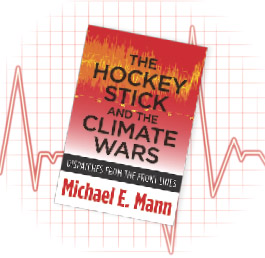A Researcher’s Fight
A Penn State scientist recounts his ordeal as a target of climate-change deniers.
The Hockey Stick and the
Climate Wars: Dispatches
From the Front Lines
by Michael E. Mann, Columbia University Press, 2012.
395 pages
Like the climate, the climate change wars are heating up. After muted mention in the 2012 presidential debates, global warming came to the fore during the February State of the Union address when President Obama declared that 12 of the hottest years on record have occurred within the past 15 and that recent extreme weather is no “freak coincidence.” Obama urged a bipartisan, market-based solution by Congress, suggesting that his administration will take action if Congress does not. Issuing the Republican response, Marco Rubio dismissed what he termed job-killing laws, arguing that “government can’t control the weather.” The Florida senator has subsequently questioned human responsibility for changes in the climate, noting that among scientists, there exits “reasonable debate on that principle.”
In The Hockey Stick and the Climate Wars, climatologist Michael E. Mann asserts that consensus about human impact on the climate is, in fact, very strong; that most “debate” takes place outside the scientific community; and that much of it has been anything but reasonable. Few scientists deny the urgent need to address this issue: As a 2010 letter in Science magazine, signed by 250 National Academy of Sciences members, put it, “for a problem as potentially catastrophic as climate change, taking no action poses a dangerous risk to our planet.” The same letter denounced “McCarthy-like threats” against scientists by groups seeking to obstruct political action. Hockey Stick tells the story of Mann’s own harrowing experience as a key target of such groups, many funded by the fossil fuel industry.
The focus of “Climategate” was a study first published by Mann and colleagues in 1999 with a graph illustrating global temperatures dating back to the year A.D.1000 The graph gained the “hockey stick” label for its shape: a line of moderately varying temperatures up to the 20th century with a sharp increase over the past 50 years – not unlike the blade and shaft of a hockey stick. While the study did not ascribe causes to the increased warming, Mann claims that early climate change opponents aimed to discredit the findings and the scientists who produced them. The hockey stick study gained even greater notoriety after appearing in a 2001 report for the Intergovernmental Panel on Climate Change.
As early as 1999, Mann found himself swept into a maelstrom of orchestrated attacks in blog posts, newspaper articles, and cable talk shows. By 2009, Mann writes, a fierce campaign was waged to force his employer, Penn State University, to investigate and fire him; for colleagues to denounce him; and for his National Science Foundation grants to be revoked. Mann’s email was hacked, with select passages published on the Internet; a belittling video appeared on YouTube; and several House Republicans called for investigations of his work. Mann and his colleagues were eventually exonerated of wrongdoing, and the tactics used against them were denounced by many. Nonetheless, climate change denial continues unabated today.
Now director of the Earth System Science Center at Penn State, Mann describes himself as a researcher who was once content to remain in his lab analyzing data and “pursuing curiosity-driven science.” Today he realizes the imperative for scientists to commit their expertise to public discourse on issues of pressing societal importance. Public advocacy may not be a comfortable role for many academics, he writes, yet “without a science-literate and politically aware populace, there can be no match against well-funded, well-organized groups that place little value on honesty or integrity, that cleverly masquerade denialism as skepticism.”
Addressing that need, Hockey Stick serves as an excellent primer on climate change science, with early chapters detailing the methods by which climatologists analyze their data. Just as significant are the book’s closely documented account of “a massive disinformation campaign funded by powerful vested interests” and the warning it issues to researchers who prefer to remain above the fray of politics. Given the urgency of our global situation, Mann argues, it behooves not just scientists but everyone to become informed and engaged.
Robin Tatu is Prism’s senior editorial consultant.
Category: On The Shelf
